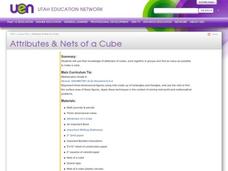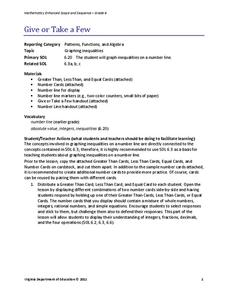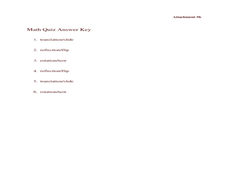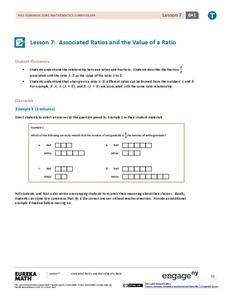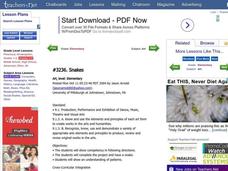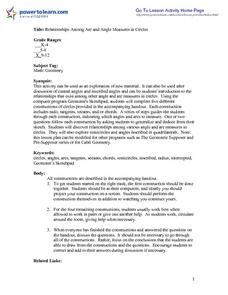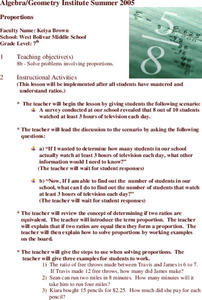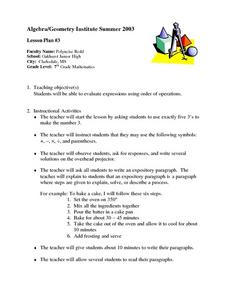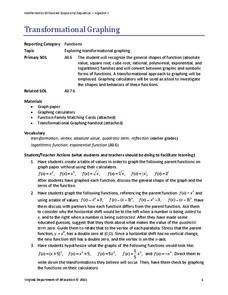Curated OER
Symmetrical Geometry Paintings
Here is a clever, cross-curricular lesson that combines art and geometry. Learners design a painting that uses geometrical shapes and is symmetrical. Sponge-shaped geometrical figures are used to design half a page and fold them to...
Baylor College
How Can We Find Out What Is in Water?
Using paper chromatography, water watchers discover that several substances might be dissolved even though they aren't visible. In this case, you will prepare a mixture of three different food colorings for them to experiment with. A...
Curated OER
Attributes & Nets of a Cube
Third graders engage in a lesson that focuses on the attributes and forming of a cube. They construct a cube using different combinations while comparing a square with only two-dimensions. Students fold paper while following the...
Curated OER
Cantilevers
Students perform an experiment to find the linear relationship between the appllied weight and the bend of the cantilever. In this linear relationships lesson, students follow detailed directions to set up an experiment. They add weights...
Curated OER
TAKS 4th Grade Equivalent Fraction Practice 2
In this TAKS fourth grade equivalent fraction practice two worksheet, learners solve the fraction equivalent to three equations. They follow the directives given to each equation.
Virginia Department of Education
Give or Take a Few
Young mathematicians extend their knowledge of rational numbers on a number line to graph inequalities by first using number cards to compare rational numbers. They finish by using similar reasoning to graph inequalities on a number line.
Curated OER
Design Team Challenge
Pupils work in groups to build a robot. For this robotics lesson, students create an electronic robot and program it to follow directions. They create an obstacle course for the robot to follow and test its performance.
Curated OER
Fun With Transformations
Demonstrate and discuss the three types of transformations: rotation, reflection, and translation. Participate in a game which helps to reinforce and practice what they learned. Groups work collaboratively to complete the game.
EngageNY
Sequencing Reflections and Translations
Don't get out of order! Examine the effect of order on a sequence of transformations. Learners perform reflections and translation transformations in sequence. They see that changing the order of the transformations does not always have...
Curated OER
Constructing and Measuring Angles
Fifth graders complete an introduction to the Geometer's Sketchpad software. They explore various beginning functions and practice using required tools. Using the sketchpad, 5th graders measure given angles. They complete follow-up...
Curated OER
SPIRIT 2.0 Lesosn: Adding and Subtracting Integers
Six pages prepare you to introduce your math stars to the addition and subtraction of positive and negative numbers. They drive a robot back and forth on an actual number line to represent the operations. If you don't have access to a...
EngageNY
Associated Ratios and the Value of a Ratio
Do ratios have values? The seventh lesson in a series of 29 introduces the value of a ratio. Pupils create associated ratios to a given ratio. They also describe the fraction associated to the ratio as the value of the ratio.
Curated OER
Snakes
Students follow directions to make a snake out of patterns. They research a specific snake and present it to the class in a group. They listen to a presentation about the King Cobra snake prepared by the teacher.
Curated OER
Relationships Among Arc and Angle Measures in Circles
Students follow the directions on the attached worksheet to construct shapes using Geometer's Sketchpad. To start the lesson, it is suggested that the teacher guide the students through the initial problem. When constructions are...
EngageNY
Sequencing Translations
Investigate the results of multiple translations on an image. Scholars use vectors to perform a sequence of translations in the seventh lesson of 18. They examine the results and determine the importance of using a sequence rather than a...
EngageNY
Distance on the Coordinate Plane
Scholars learn how to find the distance of vertical and horizontal line segments on the coordinate plane in the 19th installment of a 21-part module. The use of absolute value comes in handy.
Curated OER
Proportions
Seventh graders participate in a lesson that focuses on having them solve different proportions. The lesson includes an example that the teacher can work from in order to deliver direct instruction.
Curated OER
Rules of Divisibillity
Sixth graders participate in a lesson that covers the Rules of Divisibility. They play a game for a warm-up before the direct instruction. Following the rules being covered they finish the lesson using an assignment included in the...
Curated OER
Evalating Expressions
Seventh graders investigate the concepts realted to using the Order of Operations. They write an expository paragraph to prepare for the direct instruction of the order or sequence to simplify numerical expressions.
EngageNY
Conversion Between Celsius and Fahrenheit
Develop a formula based upon numerical computations. The 31st part of a 33-part unit has the class determine the formula to convert a temperature in Celsius to a temperature in Fahrenheit. They do this by making comparisons between the...
EngageNY
The Opposite of a Number's Opposite
It's said that opposites attract, but what about opposites of opposites? Individuals learn about the opposite of opposites using number lines. They complete a group activity in which members determine the opposite of opposites of...
EngageNY
Developing a Statistical Project
The 17th lesson in a unit of 22 presents asks the class to conduct a statistics project. Pupils review the first two steps of the process of asking a question and collecting data. They then begin the process by developing a...
Virginia Department of Education
Transformational Graphing
Find relationships between the structure of a function and its graph. An engaging lesson explores seven parent functions and their graphs. Learners match functions to their graphs and describe transformations.
Virginia Department of Education
Functions 1
Scholars learn what it means for a relation to be a function and see various representations of functions. After learning the definition, they participate in a card sorting activity classifying relations as functions or not.


